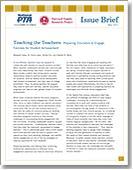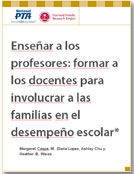The Harvard Family Research Project separated from the Harvard Graduate School of Education to become the Global Family Research Project as of January 1, 2017. It is no longer affiliated with Harvard University.

|
May 2011 Teaching the Teachers: Preparing Educators to Engage Families for Student AchievementMargaret Caspe, M. Elena Lopez, Ashley Chu, & Heather B. Weiss Download a PDF of this publication (400 kb) | View all publications in this series |
Article Information
- Full Text (HTML)
- Full Text (PDF: 400 kb)
Harvard Family Research Project and the National PTA® have teamed up to bring you the third brief in our ground-breaking series about family engagement policy, highlighting the need for teacher education programs to prepare teachers to better work with families.
To be effective, teachers must be prepared to collaborate with families to support student success. Many studies confirm that strong parent–teacher relationships relate to positive student outcomes, such as healthy social development, high student achievement, and high rates of college enrollment. Thus, by giving teachers the support they need to work with families, teacher education programs can have an even greater impact on student achievement.
For this reason, some institutions of higher education are already taking innovative steps to prepare teachers to work with families through coursework and hands-on experience in schools during preservice and into their early years of teaching. Teaching the Teachers highlights those promising strategies through five case studies, and examines how teacher education programs can create the foundation for meaningful and effective family engagement. This brief describes five core elements necessary for a system of teacher training and professional development in support of family engagement, distilled from the case studies of existing teacher preparation programs. The brief also addresses the policies needed to support this type of teacher preparation system. The five core elements in the system are:
- Standards for family engagement
- Curriculum that advances the skills, knowledge, and attitudes that teachers need to engage families
- Collaborations among various stakeholders
- Continuing professional development around family engagement
- Evaluation for learning and continuous improvement
With current public policy and philanthropic investments focused on teacher quality and overall effectiveness, the time is ripe for new models and approaches to preparing teachers for meaningful and effective family engagement.
Also available En Español.
APPENDIX: RELATED RESOURCES (Online-only)
The appendix below provides links to resources described in the case studies in Teaching the Teachers. Resources are organized by the five core elements described in the brief, and can be used by college and university teacher education programs to integrate family engagement into their preservice teacher preparation.
Appendix Contents
- Standards for family engagement
- Curriculum
- Collaborations among various stakeholders
- Continuing professional development
- Evaluation
- Other resources
STANDARDS FOR FAMILY ENGAGEMENT
Kansas State Parental Information and Resource Center (PIRC)
- PTA’s National Standards for Family-School Partnerships
This document outlines four findings from a review of research about the impact of partnerships on student success and describes the six National PTA Standards for Family–School Partnerships.
Bank Street College of Education
- Family Partnerships in Head Start Program Performance Standards
The Head Start Program Performance Standards are used by Head Start and Early Head Start programs. Subpart C—Family and Community Partnerships—outlines what Head Start grantees and delegate agencies must do to engage families. - 2010 NAEYC Standards for Initial and Advanced Early Childhood Professional Preparation Programs
This document provides a framework for preparation programs and professional development for early childhood professionals. It includes six standards. Standard 2: Building Family and Community Relationships describes the knowledge and competencies early childhood professionals need to successfully engage families and communities in supporting children’s learning and development.
Kansas State PIRC
- Curriculum Enhancement Initiative Application (PDF, 115 KB)
Institutes of higher education in Kansas completed this application to apply for the curriculum enhancement program described in the Kansas State PIRC case study. This application can be used as a model for other universities in designing similar curriculum enhancement programs that help new teachers learn about and strategize new ways to engage families to support student performance. - Wichita State—Family and Parent Involvement Curriculum Enhancement Initiative (PDF, 102 KB)
Wichita State used funding from its curriculum enhancement grant to develop a course entitled Urban Teacher Preparation Program Seminar. This document describes the course and outlines instructional goals and activities designed to meet PTA National Standards for Family-School Partnerships. - Ottawa University—Family and Parent Involvement Curriculum Enhancement Initiative (PDF, 217 KB)
As described in the Kansas PIRC issue brief case study, Ottawa used its curriculum enhancement grant to focus on organizing faculty members into learning communities focused on family engagement. This report describes the work of these learning communities, and includes comments from faculty who participated in the communities as well as teacher candidates taught by these faculty. The report also includes ideas generated at meetings to meet PTA National Standards for Family-School Partnerships. - Parent Teacher Education Connection Website
Developed by KPIRC and University of Northern Texas, this website provides six online modules for preparing teachers to work with families, based on the National PTA Standards. Each module contains goals, interactive content and activities, and several relevant program studies. The module topics are: 1) Welcoming, 2) Communicating, 3) Supporting Student Success, 4) Speaking Up for Every Child, 5) Sharing Power, and 6) Collaborating with the Community.
Bank Street College of Education
- These three course syllabi provide models of how coursework can be organized to include family engagement as a part of the teacher preparation curriculum. Each syllabus includes a course description, goals, readings, and assignments.
University of Minnesota
- Teacher Education Redesign Initiative (TERI)
This website provides more information on the Teacher Education Redesign Initiative (TERI) described in the University of Minnesota program profile. - Teacher Education Redesign Initiative (TERI) Blog
This blog follows the development of TERI and provides updates from TERI task groups and meetings.
COLLABORATIONS AMONG VARIOUS STAKEHOLDERS
Metropolitan State College of Denver
- Partnership School Profiles
These 13 school profiles describe the partnerships between the Center for Urban Education and local schools. Each profile includes background information, a description of the partnership, and a brief overview of the school community. - Video of Preschool Science Fair
This is a short video of the preschool science fair described in the Teaching the Teachers case study. Preservice teachers collaborated with teachers at a partnership school to host a science fair for children and families, in which teams of preservice teachers prepared displays and interactive activities to engage both the preschoolers and their parents. - A Case Study of the Center for Urban Education: Evolution of a Partnership to Prepare Urban Teachers (PDF, 1.1 MB)
Mid-Continent Research for Education and Learning (McREL), an external education and research organization, conducted a case study of CUE during the 6th year of the partnership between Denver Public Schools and MSCD. The report examines six characteristics of CUE: 1) environment, 2) communication, 3) membership, 4) processes/structure, 5) shared vision, and 6) resources. It provides examples of how partners were able to work towards common goals and identify strategies with mutually beneficial impacts.
University of Minnesota
- Partnerships with Schools (PDF, 180 KB)
Partnerships with schools comprise a key area of redesign under the Teacher Education Redesign Initiative (TERI) described in the University of Minnesota case study. These slides describe how a partnership is formed between UMN and professional development schools, and how the partnership works to better prepare teachers to work in diverse school settings.
CONTINUING PROFESSIONAL DEVELOPMENT
Chicago Urban Teacher Education Program (UTEP)
- Post-Graduation Support
This webpage describes the support that Chicago UTEP alumni continue to receive after graduation. Such supports include individualized in-classroom coaching, bi-weekly professional development meetings, the opportunity to lead inquiry groups, access to an online community, and a monthly workshop series.
Metropolitan State College of Denver
- 4th Annual Great Teachers for Our City Schools National Summit
The purpose of the Great Teachers for Our City Schools National Summit is to build and strengthen a national network where urban educators can share research findings, instructional practices, program strategies, policy initiatives and other resources aimed at developing and supporting the best and most effective teachers for students in high-need urban schools.
Kansas State PIRC
- IHE KSU Quasi-Experimental Research Study 2010 Progress Report (PDF, 270 KB)
This progress report provides details of the quasi-experimental study conducted at Kansas State University and described in Teaching the Teachers. It outlines the procedures, rationale, and findings of the study. - The Power of Partnerships Family Survey (PDF, 52 KB)
Families complete this PTA survey to help schools assess the quality of school–family partnerships. The survey asks 21 questions about families’ perceptions of school–family partnerships, which educators can then use to evaluate their progress. Also available in Spanish (MS Word DOC, 85 KB). - Parent/Family and Teacher Survey Form (PDF, 82 KB)
This survey was used for the IHE KSU Quasi-Experimental Research Study described above. The survey was administered as both a pre-test and post-test to measure teacher candidates’ attitudes toward and preparation for family engagement. - IHE Family Engagement Curriculum Enhancement Practicum Worksheet (PDF, 1.1 MB)
This worksheet was designed for student teachers to record the types of interactions they have with parents during their practicum. The purpose of the worksheet is to collect data on family engagement by helping students determine the frequency and type of family interaction.
University of Minnesota
- Teacher Performance Assessment
The Teacher Performance Assessment is an instrument being developed by the American Association of Colleges for Teacher Education, Council of Chief State School Officers and Stanford University to measure the performance of new teachers and to improve the consistency with which teacher licensure and accreditation decision are being made across states. One of the domains in the Teacher Performance Assessment will look at how teachers understand their students’ cultural contexts and socioeconomic backgrounds as they relate to student learning.
Webinar—The Teacher–Parent Relationship: Using Professional Development to Improve Family and Community Engagement
- This webinar from the Achieving Excellence & Innovation in Family, School, & Community Engagement series examines practical examples of how states can embed family engagement into their professional development systems and how teacher education programs can systematically include family engagement in teaching and learning. The webinar also discusses promising practices in higher education, including partnerships with Parental Information and Resource Centers (PIRCs) to build the capacity of family coordinators.
Free. Available online only.


